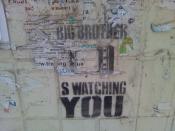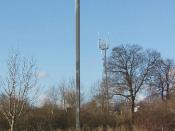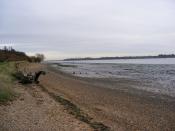As a new society unfolds, so do new values and authority. In 1984, George Orwell presents a futuristic vision of the power of government as well as its social conventions. Primarily, Orwell uses Winston Smith to exhibit the effects that government control can have on morality. Winston lives in Oceania where "The Party" exploits its complete power by controlling people emotionally and mentally. However, this disturbs Winston who subsequently challenges The Party and is provoked into becoming a rebel. He recognizes that he is at the point of no return; consequently, he marches blindly ahead in the hope of defeating The Party. However, Winton's defiant nature is quickly extinguished after he is caught and tormented for committing subversive acts. The once rebellious Winston is then forever changed, as he becomes a loyal subject of Big Brother. Winston's challenge of Oceania's imposed values and beliefs demonstrates humanity's need and subsequent pursuit of freedom.
In Oceania, The Party is seen as the ultimate power; it imposes its authority and fear over its citizens with the use of technology. From the street corners to Winston's living room, the telescreens are used to monitor the thoughts and actions of its people. "It was even conceivable, that they watched everybody all the time. But at any rate they could plug in your wire whenever they wanted to. You had to live- did live, form habit that became instinct- in the assumption that every sound you made was overhead, and, except in darkness, every movement scrutinised." (Orwell 5). By not knowing which move is being watched or which words are being listened to, all privacy and freedom of speech is eliminated from their daily lives. The telescreens are used as a source of control and power rather than communication. They also display propaganda from the Ministry...


